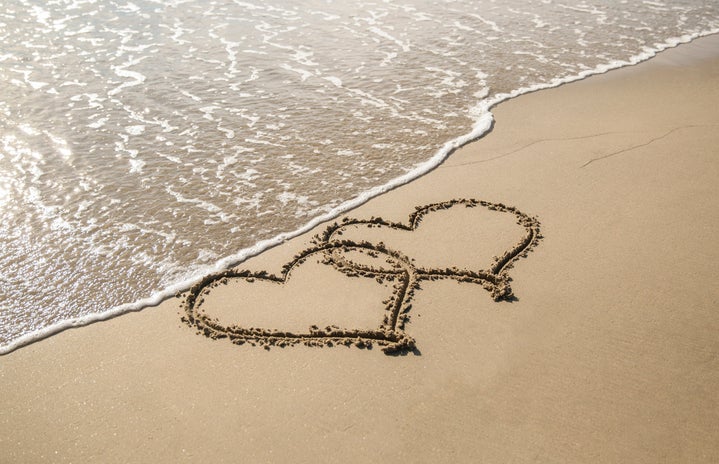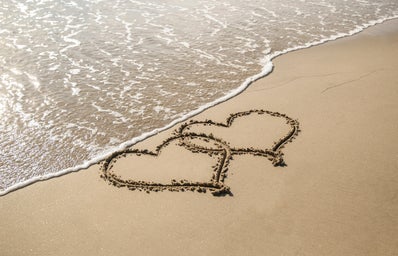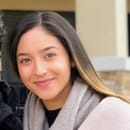Landing in the airport of Havana, Cuba I see everything is outrun and outdated. There are no machines to transport bags from the air crafts to the belts for travelers to reclaim their belongings. There are no forms of technology or automated screens to guide you to your next gate or destination. There are no running streams of water rushing out of the sinks in the bathrooms like in the United States. You struggle to get just a few drops on your hands, when you begin to ask yourself why hasn’t Cuba technologically or economically globalized and industrialized just as the rest of the world has?
My family and I wait for what feels like a couple of hours until a cab arrives to take us to La Vibora, Havana, the home of my mother’s spiritually enlightened aunt. Time slows down in Cuba; things and people move slowly, the pace softens. The peace of life is evident. The first time I stepped outside out of the airport and walked on Cuban soil I was hit with a wave of obliterating heat, friendly faces and a strange sense of belonging. The Cuban people work so hard, whether it be tirelessly transporting bags to driving visitors for hours upon hours a day in cabs with no air conditioning in sweltering year long heat. It was hard to wrap my head around the stigma surrounding Cuba and its people when I was surrounded by some of the hardest working and genuine people I have ever had the pleasure of meeting.
History
Cuba is well-known for its restrictive and brutal Communist regime led by Fidel Castro, one of the world’s infamous dictators. Unfortunately, many are unaware of the story that led to this spread of Communism. In 1933, Sergeant Fulgencio Batista overthrew the U.S. backed regime of Carlos Manuel de Céspedes. The U.S. backed dictator Fulgencio Batista, was the president of Cuba from 1933-1944, and dictator from 1952-1959 (© 1998-2019: nationsonline.org). While Cuba had strong relations with the United States and accelerated prosperity during this time, political violence and corruption rapidly increased. All throughout the 1900s the Cuban people were being exploited and controlled by American backed dictators whose intention was to control this neighboring nation into submission for their supply of sugar and tobacco plants. On January 1, 1959 this American backed control fueled the revolution which would later mark the beginning of the Fidel Castro regime, an anti-U.S revolutionary, right wing dictatorship that resulted in the complete polarization of society, civil war, Batista’s downfall, and the brutal destruction Cuba’s military and institutions (© 1998-2019: nationsonline.org). Fidel Castro was able to successfully convert Cuba into a one-party Communist system and destroy the relations between Cuba and the United States.
My Mother’s Journey
My mother, Ileana, was born and raised in El Cotorro, Cuba, a quaint small city located in Havana where her cramped little blue home of two bedrooms, an insufficient supply of clean water, the non-existent invention of air conditioning, open windows of insecurity and a backyard filled with fruit trees to sustain their hunger housed her five family members for nearly two full decades. While the little blue home doesn’t seem like much to the privileged eye, it was the home where my mother and her siblings created lifelong friendships with their neighbors, played in the yard for hours a day watching the time pass by, learned how to watch after one another in case of emergencies, put aside their insufferable hunger, economized every cent they were fortunate enough to make that day, and most importantly, educated themselves as much as possible fabricating dreams of someday, getting out of Cuba.
My mother’s elementary school, Catholic church, family, and friends could all be found on one long broken side-walked street occupied by the starving indigenous dogs who call those streets home. El Cotorro is not a large, populated, or even slightly industrialized city, but what El Cotorro did contain was this overwhelmingly beautiful and strong sense of community highly evident as I watched the neighbors look after and treat one another with deep respect and protection just like one would with their own family. There was an insufficiency of medicine within the pharmacies; they must have contained two bottles of medicine at maximum. The people were physically and emotionally run down both by the heat-draining atmosphere as well as the oppressive and destructive corruption of the government.
In Cuba, your status in life is immobilized, your career or job remains the same, if you are fortunate to obtain a home, you know that is the home you and your family will inhabit forever. There is no moving up in the world or working hard enough for your family to live comfortably. You make what you make, there are no raises, promotions, opportunities or miracles. The government controls how much money the Cuban people will make and control everything from the size of the homes to the heavily censored and non-existent internet to the shortage of food supply on the market’s shelves to the inaccessibility of importing new cars. Every phone call or use of data and wifi must be monitored within concentrated spaces such as the local parks, so that the government can instill their power and monitor every citizen’s conversations.
Back in the 1950s, when U.S backed leaders controlled Cuba, there was easy accessibility to travel to and from the United States. My great grandmother feared the impending Communist regime and mass Cuban revolt, and sought to escape before the newly instilled government could take away her rights and freedoms. She quickly filed paperwork to become a U.S citizen, packed all of her belongings, and moved to the United States just before Fidel Castro completely banned Cubans on seeking refuge or becoming citizens in any other country. My great grandmother left Cuba not because she didn’t love her home, the people, or her roots. She left for her freedom, for safety, for life, and for family.
My great grandmother, for years tirelessly worked to claim my grandmother, mother, aunt, and uncle as her family and legally bring them over as citizens of the United States. It took almost two decades for the paperwork to file through, when one day it happened. My grandmother, mother, and aunt were finally able to rejoice and thank God for the opportunity to become, what most privileged people take for granted, legal citizens of the United States of America.
My mother, at the age of sixteen, packed one single bag and with that she left the rest of her family, home, friends, and the heat of Cuba without ever looking back. She would work hard enough to never go hungry again. That day she flew into Mexico, then to Miami, where she was greeted and received by a distant family member who had a bag of used clothes waiting for her arrival. My mom had nothing yet everything at the same time. She moved to Rhode Island, continued on with her high school education, learned to speak fluent English, and roamed the halls embracing her Latindad, large black curls, love for math, and humility.
Returning Home
This past July, my family and I planned to spend our Summer vacation in Cuba, so that my mother could finally reunite with the family and friends she had not seen in over twenty-one years. While President Trump has banned all travel to Cuba through cruise lines, nothing stops you from reuniting with family. We obtained our Cuban visas and were determined to see the heart-warming look on my mother’s face when she could hold her loved ones once more.
The cab took us from the airport to La Vibora, the home of a spiritually enlightened artist who I am proud to call my aunt. My aunt is a Cuban artist who receives messages within her dreams, wakes up feeling inspired, and paints her life away. All of the walls in her house are covered from head to toe in her own artwork and paintings from dreams of God. She is most known for restoring the home of Ernest Hemingway, uncovering writings, and preserving his captivating life’s work. Her home is a walking museum filled with handmade sculptures of her role models, stray cats who have made a home within her backyard, hammocks to lay out in the Cuban breeze, and the best frijoles I have ever had in my life. Even with the lack of money Cubans have, she made sure my entire family was fed, housed, and protected every single night we were there.
One day of the trip we went back to El Cotorro, a place my mom never thought she would return to. El Cotorro, a place that went from home to memories. Our cab pulled up to the street where my mom grew up and it is a day I will never forget. We slowly walked up to her neighbor’s house as she spotted her best friend, Mimi. My mother said, “Soy yo Mimi, ¡recuérdame! Es Ily, tu vecina. Estoy en casa estoy en casa.” My mother kept repeating, “It’s me, it’s me, I’m home, I’m finally home.” Her neighbor took a second to recognize who was standing outside. She had not seen my mother in over twenty years. Twenty years does a lot to one’s appearance. The second my mom said her name, she dropped the kitchenware in her hands, and sprinted out of the doorway to her home. She held my mother’s face in her hands, while teary-eyed, thinking “is this really you?” and grabbed my mom in the tightest embrace as I watched the complete rush of tears drop like a waterfall. They cried and cried bringing each and every one of us to tears. She was finally reunited with her best friend, her second sister. Mimi, was not as fortunate as my mother’s family, having the opportunity to become U.S citizens. My mother showered her in gifts of clothes, food, toys for the local children, and money. When I asked my mother if she wishes she could bring her to the United States, she replied “There is not a single day where I don’t wish for that.”
First Experience
The rest of the trip I began to increasingly love my heritage, culture, and roots. Cuba is one of the most beautiful and vibrant Caribbean islands I have ever been to. The fruits are rich, the homes are colorful, the people are energetic, the music is loud, the beaches are crystal clear, the sunsets are breathtaking. The sunsets paint across the 7 p.m. sky overlooking the rows of old cars and swaying palm trees and you definitely can sense, “Yes, this is what peace must feel like.” Cuba is like travelling back in time, a time capsule of old American cars that still run in perfect condition, always lit Cuban cigars, endless mojitos, the lack of internet and technology and pure enjoyment of life. From the little girl I met with a passion for life to the incredible woman who cleaned our rooms in the hotel, life is full and vibrant.
While in Cuba we spent a few days basking in the sun of the beaches of Varadero and swimming in the dimly lit caves of the city of Matanzas. We spent an endless amount of hours swimming, being able to see the nail polish on our feet with our whole bodies submerged in the water. The water is calm, in Varadero there are no waves, no pollution, no disruption of life. We floated there endlessly, feeling the white, smooth sand between our toes, being greeted by the kisses of the Sun. We drove speed boats across the rigid Matanzas river waters, and high dived off cave rock formations into blissfully cool natural pools of water in the middle of nowhere. We snorkeled through colorfully exotic fish, rode free range horses, drank strong black coffee, ate pulled pork and black beans in the campesinos, and completely disconnected ourselves from the rest of the world.
Embracing Latinidad
All my life I was ashamed of my heritage, ashamed of my roots, ashamed of being a Hispanic Latina. I was looked down upon for my tan skin, dark black curls, and having parents who pronounced my name with a Y instead of the J in Jessie. I was looked down upon for having immigrant parents, for having a Spanish accent, for not being white. I tried so hard to adapt, to make myself like the food and culture of my white friends, classmates, and peers. I never allowed myself to leave my hair natural or speak Spanish. I never embraced the features, love, and family culture that comes with being Hispanic. Looking back, I wish I had the confidence to embrace who I was back in elementary, middle, or even high school. Learning about the sacrifices and struggles my parents made in order for my siblings and I to be born here is something I will never take for granted again.
I have learned there is so much beauty to being a Hispanic female and to having a large and loud Cuban and Peruvian family. I have learned that the curls on our heads are beautiful and are to be embraced, not hidden. I have learned that speaking Spanish allows us to communicate with much more of the world than only speaking English. I have learned there is more to life than hiding who we are because society tells us the White woman is the vision of beauty. My mother’s curls are beautiful, as are all the women who comes from Hispanic countries. I have seen the resilience, strength, and humility Cubans embody and I could not be more proud to be Cuban.
The Cuban people were dealt unfortunate cards of life, but the government will never take away their humanity. The hatred and disembodied government may represent Cuba in the media and to the world, but the Cuban people are so much more than the world gets to see. The people are hard working, the people are strong, the people have this incredible sense of humor and community. You cannot dehumanize people who embrace life with open arms, dance the night away to salsa music, sew their own clothing, grow their own fruits and vegetables, and laugh until their stomachs hurt. I no longer feel like I have to hide the very thing that makes me and these people beautiful. I am Cubana and proud and that is something no one will ever be able to take away from me. From my family to yours, embrace Hispanic heritage month with open arms and never allow someone else to make you feel that where you come from is not important.



